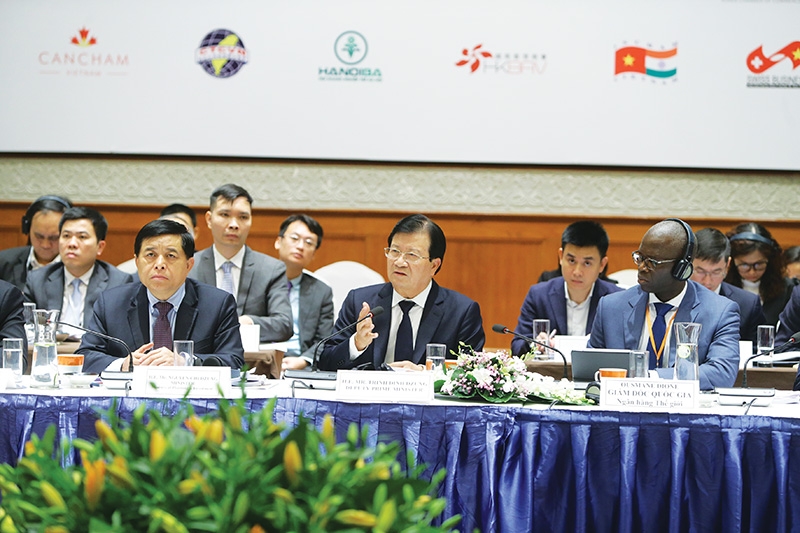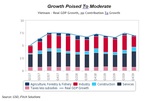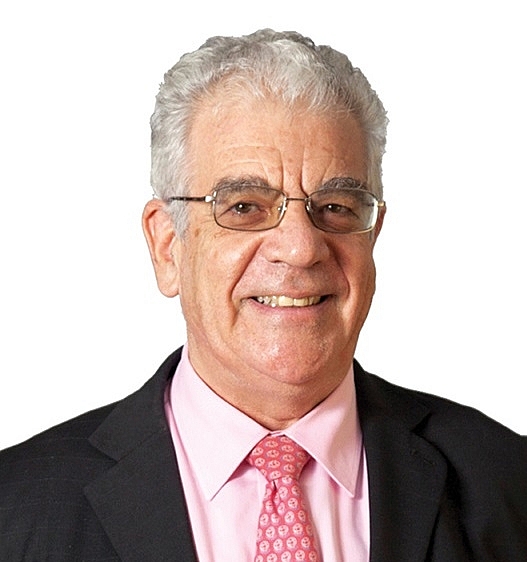 |
|
The VBF is working with the government to achieve sustainable economic growth
|
Nobufumi Miura recently attended the annual Vietnam Business Forum (VBF) for the second time as the new chairman of the Japanese Chamber of Commerce and Industry in Vietnam.
This time, he presented environmental protection as the top issue, showing a growing interest in green growth among around 2,000 Japanese businesses operating in the country.
“It is estimated that 5 per cent of GDP will be lost due to air pollution, which indicates a possible decrease in investments from foreign companies,” said Miura. “As such, we would like to request the Vietnamese government to set clear and standardised regulations and prioritise health over industry.”
Environmental protection is a special concern among Japanese firms as the country experienced similar issues due to heavy industrialisation throughout the 1960s and became known as the “Polluted Islands”.
Key sustainability concerns
Like at the previous VBF, issues such as how to improve the business climate, legal reforms, tax and customs, as well as legal hurdles in electricity, infrastructure, agriculture, education, and tourism were major concerns at this year’s VBF. However, never before has sustainability been so important.
Themed “Roles and Support of the Business Community in Rapid and Sustainable Development”, the most prestigious policy dialogue between the government and the business community touched on how to regulate sustainably and build soft and hard infrastructure for innovation in a green way.
As seen in the recommendations from business associations and VBF working groups, sustainability is a major topic in presentations. In particular, in the speech of the Investment and Trade Working Group, the head Fred Burke said innovation requires a flexible and supportive regulatory environment that allows innovators to take risks, try new things, and enjoy legal protection for their investments. Since the last VBF, some steps have been taken to address the issues raised back then.
“But for Vietnam to assume its proper place in the global innovation ecosystem, more obstacles need to be removed at the local and central level,” Burke said.
To enable businesses to drive the economy and find solutions for high-quality and innovative investment, he recommended further amendments to the Law on Enterprises, the Law on Investment, the Law on Cybersecurity, an overtime cap for the Labour Code, and resolving final financing issues related to the Law on Land to address investor concerns.
Other long-lasting concerns such as tax and customs, the enforcement of tax, post-customs clearance inspection, and trading of foreign-invested enterprises were once again raised, specifically focusing on the problem in tax regulations of exporting enterprises, value added tax on goods delivered and received outside of Vietnam, and others.
The business associations agreed that promoting a fair, transparent, predictable, and streamlined regulatory ecosystem will enable their members to support and contribute more to Vietnam’s sustainable growth.
In addition, they also offered suggestions for sustainable development of agriculture, tourism, power and energy, banking and finance market, infrastructure, and education and training.
According to the VBF’s Agri-business Working Group, to develop sustainable agriculture, Vietnam should develop its agricultural supply chain by tackling the challenges including salinity, flooding, soil degradation, climate change, disease management, overuse of pesticides and herbicides, water and waste management, and the tensions between urbanisation, commercial business needs, and farming land.
“The government should push the private sector to provide solutions to these issues such as introducing smart IT systems and other advanced technologies to set up sustainable supply chains to produce quality and safe products while maintaining the efficient use of resources and protecting the environment,” said a representative of the working group.
In a similar view, the VBF’s Working Group for Power and Energy suggested the development of a regulatory framework that truly unleashes the potential for renewables and together with a reduced dependence on coal which will require a regulatory environment that continues to encourage domestic and foreign investment.
In addition, regulatory mandates that motivate the private sector to invest in grid improvements and expansions are also needed.
Meanwhile, working groups for sectors like capital markets and banking, infrastructure, and human resources, and education recommended legal improvements to encourage private investment to help the sectors leapfrog in the Fourth Industrial Revolution.
The Vietnamese ministries, in response, said that they are working on revisions of the laws on investment, enterprises, land, and the regulations on tax and customs, among others. Moreover, they are working on new regulations such as the public-private partnership law to create much more favourable conditions for business and investment activities.
Minister of Planning and Investment Nguyen Chi Dung noted that in the coming time, Vietnam will take more initiatives in attracting high-quality foreign direct investment with high technology and environmental protection among the key criteria.
“The country will prioritise the projects with advanced and future technology, modern governance, high added value, wide influence, and links to global production and supply chains. Thus, we welcome all suggestions for promoting sustainable economic development.”
Ups and downs
Vietnam’s business environment has improved positively on the back of the government’s strong actions. Lying at the heart of such efforts are resolutions on business environment and enterprise development, including Resolution No.19 promulgated annually from 2014 to 2018, Resolution No.02 in 2019 (replacing Resolution No.19), and Resolution No.35 in 2016. However, there is still an imparity among sectors.
Among the key points ò Resolution 02 on key tasks and solutions for improving the domestic business climate and national competitiveness in 2020, business establishment and access to electricity are the two most improved. On the other hand, business bankruptcy, investor protection and import-export procedures have only improved marginally.
According to the Vietnam Chamber of Commerce and Industry’s surveys in 2019, business registration via post office or public service centres increases from 12.5 to 17.4 per cent.
Taxation procedures are improved and online tax claims rose to 98.4 per cent. However, tax inspection has not improved much, with 33 per cent of enterprises responding that tax officers interpret legal provisions in a disadvantaging way for businesses, and 30 per cent reporting the existence of unofficial costs during tax inspection.
Access to finance is still the second-most difficult area for enterprises, with the biggest constraint being the necessity of collateral for loan granting.
Business and investment conditions have dramatically improved with the reduction of investment and business conditions. Only 48 per cent of enterprises have to apply for conditional business licenses (down from 58 per cent) and 34 per cent of enterprises said they encountered difficulties when applying for a business license (down from 42 per cent).
Almost all ministries have reduced the product line as a subject of examination. However, the request from the government to extensively apply risk management and move from goods examinations at the border to checks during market circulation is still not widely applied.
Moreover, it is worrisome for enterprises that they cannot always predict changes of policies. A number of enterprises never or hardly are able to predict policy changes.
Vietnam set a target to have one million enterprises in 2020. If the growth rate of new registered enterprises is maintained, by the end of 2020, Vietnam will have approximately 984,000 enterprises.
Moreover, the country has set general targets to improve the business climate with actions such as increasing the World Bank’s score on the Ease of Doing Business by 10 notches, and increasing national competitiveness in the Global Competitiveness Index 4.0 by five ranks. Hence, reform solutions must be maintained and further facilitated during the rest of the year to reach these targets.
|
Nguyen Dinh Chi - Deputy director, Tri Dat JSC
As a company providing services for foreign-invested manufacturers in Vietnam, in 2020, we aim to extend our business by 20 per cent, winning over more customers from countries with developed industries such as Japan and South Korea. Foreign-invested enterprises always pay attention to technology, the environment, human resources, and safety, so supporting companies like us also have to make them a priority in our development orientation. Besides this, with the continuous change of manufacturing technologies, I think staff should improve their foreign language skills, particularly English, so that they can approach and work with advanced technologies. Meanwhile, the government should have incentive policies in terms of corporate income tax for newly-established companies. Supporting enterprises need to be assisted with a lower import tax so that we can increase our competitiveness with better prices and technologies. Also, there should be conferences to exchange experience among enterprises operating in the same fields, and business-matching events so that we can create supply chains and integrate into global development. Aleksandrs Parfjonovs - Head, Vietnam Operations Grindeks JSC
I noticed many improvements for businesses such as free trade agreements and many dialogues with the gorvernment like the VBF. This is important for both businesses and the government towards understanding each other. Vietnam is among the fastest developing economies in the Asia, therefore actual steps for the improvement should be taken fast, while keeping in mind the sustainability of the growth. As for the general business climate, it is moving in a positive direction, with most important issues such as the extremely complex taxation rules being actively discussed. Over the year, I have noticed improvements in many areas, and hope it will be continued in the same way. With regards to my field, in general the pharmaceuticals business is one of the more restrictive and sensitive businesses in Vietnam. The main serious challenges that need to be addressed are particularly certificates for pharmaceutical product requirements in accordance with World Health Organization guidelines. Vietnam is our main market in Southeast Asia and we are working with our partners on bringing more high quality medicine to the country. William Badger - Director of Community Outreach, Concordia International School Hanoi
Overall, I think the business environment in Vietnam is very positive. There is a lot of interest here. The biggest concern will just be the environment. Our business is related to family, both international families of diplomats or investors and also to Vietnamese children. Vietnam, at the moment, is considered a family-friendly destination thanks to the availability of high-quality schooling. But if we look at the air quality or other environmental issues, the country might be labelled as a “dangerous” post for families, which will affect the educational environment. Other than that, Vietnam provides us a very favourable environment for investment. We have actually expanded and been increasing our investment significantly these past few years. We have been and we are investing in Vietnam for the long term and expect to be in here for 50 years or more, providing top-quality education. This helps attract more people coming to Vietnam and helps keep Vietnamese families staying here. Rad Kivette - CEO cum executive director VinaCapital Foundation
I have been in Vietnam for 20 years and see that the country has made an effort to improve the investment environment for enterprises. However, similar to other developing countries, there are still many things that need to be done and one of the most important issues is the reduction of paperwork and consistency of laws. I think Vietnam’s legal system is quite decent but there are numerous overlapping laws and conflicts, and sometimes there are gaps where foreign investors, especially new ones, face difficulties in completing procedures to start their business and investment in Vietnam. They need more comprehensive efforts from the government to tie all of the laws together to make it work. Lastly, the government has to sync its work across all ministries to make sure that all existing laws are consistent. Colin Blackwell - Founder and CEO Enablecode Co., Ltd.
Vietnam has needs that align with a range of policies, strategies, and resolutions with an effort to reform its education towards Industry 4.0. Specifically, the Fundamental and Comprehensive Reform of Higher Education in Vietnam 2006-2020 and the National Strategy on Human Resource Development 2011-2020 have focused on lifelong learning and soft skills, technical skills, and interpersonal skills for all students. Higher education institutions, with regards to Industry 4.0 should focus on the learner, supported by technology, in-person guidance, and industry-relevant content to meet the learner’s individual needs. It is necessary to focus on building unrivalled student experiences through flexible programme structure that enables lifelong learning and provides learners with multiple entries and exit options. It is also required to enhance the skills of the teaching staff at all levels of the state education system by providing them with access to international standard continuous professional development and teacher training in modern educational practices. To further encourage foreign direct investment in this sector, local public education institutions should be encouraged to partner with private international education institutions for the training of teachers working in public schools. Kitamura Shu - Senior representative Japan International Cooperation Agency
The number of listed companies in the Vietnamese equity market has been steadily increasing due to the strong demand for capital mobilisation of private companies as well as the progress of state-owned enterprise restructuring in recent years. On the other hand, the market has more potential to grow in both volume and quality, and there still remains several challenges to be tackled going forward. Currently, the market is classified as a frontier one by Morgan Stanley Capital Information (MSCI), the third classification following the developed market and emerging market. Although it had been expected that Vietnam would enter into the upper classification in the annual MSCI review process this year, it was concluded that the country would retain the current status. This fact suggests that the Vietnamese market still has challenges to be tackled going forward to be verified as an emerging market. Overall, the key challenges must be solved, such as weaker corporate governance and disclosure of listed companies, unfair trading including manipulation and insider trading, lower compliance of market intermediaries, and an insufficient investor protection framework. Vu Minh Anh - Founder and managing director, Terraverde Travel
I have seen improvements across the board. In the travel industry, more rational policies are now in place regarding entrance and exit procedures. Visitors from some certain markets now benefit from visa exemptions or are allowed to extend visas, such as visitors from European countries. However, more improvements are needed in the upcoming time. The policies towards MICE visitors need to be more specific. In this regard, Vietnam can look at the lessons from some other regional markets such as Thailand, Singapore, and Hong Kong to develop the capacity to hold large events in the country. For example, we need specific policies for certain visitor groups, allowing visa exemptions from three to five days for MICE visitors to stay for a short-term in Vietnam to attend the events. For large events to take place in Vietnam, we need support in tax regulations or infrastructure from the government and the tourism administration, so that we can compete with regional peers in holding such events in Vietnam. Ta Quang Tung - General director A Au Vocational Guidance Corporation
In 2020, some new professions will be launched in relation to the advancements of the digital transformation, following the recruitment trends of industry 4.0. We expect to become a versatile and comprehensive vocational training system, spreading the values of vocational education to the community and meeting the goals of economic and social development. To reach further goals, businesses need to be aware of the importance of building the next generation of leaders with enough enthusiasm and capability. Improving local customer service quality should be focused to maintain the roots of business and companies’ reputation, as well as to keep the needs of the customer at heart. Besides that, building a better corporate culture coupled with social responsibility is also a long-term vision for the local sustainable business development. Kenneth Atkinson – Founder Grant Thornton Vietnam
Making tourism more sustainable is a continuous process of making optimal use of environmental resources, enhancing the respect for host communities, and ensuring viable long-term economic operations. The fair distribution of benefits among tourism stakeholders requires adequate management practices and evidence-based public policies. The United Nations published the sustainable development goals, and the World Bank supported several actions in Vietnam and the future Socio-Economic Development Strategy 2021-2030. This should be the economic, social, and environmental framework to developed the ASEAN as a future leading tourism destination. Through ecotourism services, smart city development, forest re-plantation, and national parks promotion, we must diversify Vietnam’s portfolio and reduce overcrowding in congested areas, such as in the major cities. Mandatory policies and investment from both central and local authorities are required for the development of new facilities, or through public-private partnerships,which need to be developed to support existing properties and future developments, aligned with environmental responsibility measures and fully developed waste management programmes. VIR |
Bich Thuy

Better legal framework needed to fuel economic growth: VEPR
Building a transparent legal framework; improving business climate; adopting flexible policies on imports, exports and foreign exchange rates; protecting environment will be needed to achieve economic growth target of 6.8%.

Vietnam's economic growth to ease slightly in 2020: Fitch Solutions
According to Fitch Solutions, its 2020 real GDP growth forecast for Vietnam is maintained at 6.8%.
 Vietnam has never before received so many recommendations from international investors on sustainable development in all sectors of concern, with expectations to step up involvement in socio-economic development in the new decade.
Vietnam has never before received so many recommendations from international investors on sustainable development in all sectors of concern, with expectations to step up involvement in socio-economic development in the new decade. 







